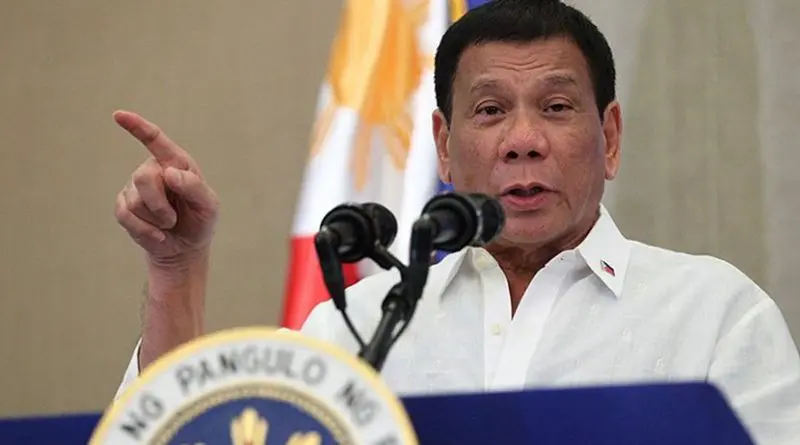Philippines: Duterte Orders Arrest of Senator Who Criticized Drug War
By BenarNews
By Dennis Jay Santos and Karl Romano
President Rodrigo Duterte has revoked an amnesty given to a senator in the opposition who has been an arch critic of his administration’s drug war, and ordered the lawmaker’s arrest.
The president, who is on a trip to Israel, signed the order last week to bring in Sen. Antonio Trillanes for his role in rebellions that broke out in 2003 and 2007, respectively, making the senator the second senior opposition member to face jail time under Duterte’s government.
The amnesty was declared void because Trillanes did not comply with minimum requirements to qualify under the amnesty proclamation, Duterte said in the order that was made public on Tuesday.
“As a consequence, the Department of Justice and Court Martial of the Armed Forces of the Philippines are ordered to pursue all criminal and administrative cases filed against former [Lieutenant Senior Grade] Antonio Trillanes in relation to the Oakwood mutiny and Manila Peninsula incident,” the order said.
In 2003, then-Lt. Trillanes along with about 300 junior military officers, led the takeover of the Oakwood Hotel in Metro Manila’s Makati business district in a rebellion against the government of then-president Gloria Arroyo. The group swiftly surrendered when Arroyo promised to look into their allegations.
Four years later, while being tried for his role in the rebellion, Trillanes and other accused military officers walked out of court and occupied another hotel, also in Makati.
The mutineers were joined by Danilo Lim, then a chief of the elite Scout Rangers, and some opposition politicians. They called for the ouster of Arroyo, although the takeover fizzled several hours later after the army crashed an armored personnel carrier into the hotel lobby.
While in jail in 2007, Trillanes easily won a Senate seat. Described as a charismatic person who often speaks his mind, he flirted with running as vice president under Duterte.
Since Duterte became president in June 2016, Trillanes has emerged as one of the leading voices against the drug war. He has also provided security to a former police officer and a self-described hit man, who claimed to have played roles in many killings blamed on Duterte and his “death squad” when he was a mayor in the south. Both have filed a murder case against Duterte at the International Criminal Court.
If arrested Trillanes would become the second member of the 24-seat Senate to be held in custody under the Duterte regime. Last year, police jailed fellow Sen. Leila de Lima, a former human rights chief and justice secretary who had led an investigation into the “death squad.” She has denied the allegation.
On Tuesday, Trillanes said he would not hide and would not resist arrest. He accused Duterte of political harassment.
Political persecution
Trillanes said the Senate leadership had agreed that he would remain in its custody until his lawyers filed a petition against the “illegal and unconstitutional” revocation of his amnesty.
“What Mr. Duterte wants to happen is to order a warrantless arrest, which seems to declare a de facto martial law,” Trillanes said. “My amnesty was granted after all requirements have been complied with. I even took [an] oath in front of then-defense officials. All my cases covered by the amnesty have been dismissed.”
Senate opposition leader Francis Pangilinan said Duterte was moving to silence all of his critics.
“We stand by Sen. Trillanes, and will use all legal means to fight this illegal and abusive exercise of presidential power,” Pangilinan said.
Edcel Lagman, a House of Representatives opposition leader and a constitutional expert, said the proclamation that granted Trillanes amnesty was proper and did not have a “revocation clause.”
“Consequently, the reported revocation by President Rodrigo Duterte of the amnesty granted to Sen. Antonio Trillanes has no legal and factual basis,” he said.
He said that because any presidential declaration of amnesty needed the concurrence of both houses of Congress, any move to revoke such an order needed their concurrence in the first place.
“Amnesty, which obliterates past offenses, is final, absolute and irrevocable unlike a presidential conditional pardon,” Lagman said.
Malaysian politician reacts
Meanwhile on Tuesday, Anwar Ibrahim, who from jail led the opposition bloc that upset the ruling Barisan Nasional coalition in Malaysia’s general election in May, said he did not agree with the Philippine government’s opposition crackdown.
“My consistent view is we cannot abuse power to victimize opposition participants,” Anwar told a news conference at a business conference in Manila.
While admitting he did not know the full details of the arrest order, he said everyone must be given due process.
“If I meet President Duterte, I will tell him I support some of his measures. But I will also tell him to continue to ensure there is a vibrant democracy and respect for the rule of law in the Philippines,” Anwar said. “I don’t agree with political leaders, dissidents, journalists being treated in that manner.”
From Israel, Duterte spokesman Harry Roque denied that the president was engaged in silencing his critics, and said Trillanes must face up to his past actions. Roque said government lawyers had been studying the case for the past two years.
“Well, the past finally caught up with Sen. Trillanes. He is responsible for his current state today,” said Roque, according to official transcripts.
Traveling with Duterte in Israel, Roque said the president was not engaged in any political vendetta and stressed Trillanes should be accountable for his actions.
“You can’t just make bombs in Oakwood and take over the Manila Peninsula without consequences,” Roque said. “It doesn’t work that way.”
Luis Liwanag in Manila contributed to this report.

